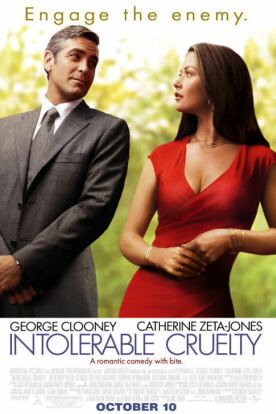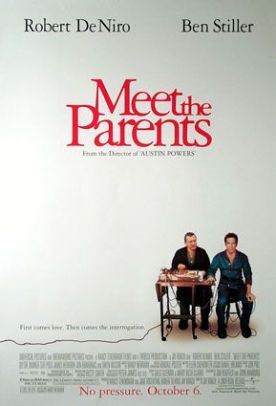Intolerable Cruelty
Ever since divorce became common, the time-honored language of love has been uttered with an inevitable undercurrent of cynicism. “I’ll love you forever. . .” always and necessarily includes the unspoken reservation “. . .that is, until I get tired of you or find someone I like better.” We don’t like to be reminded of this, particularly when we are in love, and yet we can never quite forget it either. In the arts, for which love has always been a favorite theme, this guilty secret poses a special problem, and every believable love story of our times has to be a balancing act between naVveté and cynicism.
Unconcerned with believability, post-modern movie-makers generally opt for cynicism — or a phony naVveté that is just cynicism in another form. That’s one reason why there are so few good love stories these days. In Intolerable Cruelty, Joel and Ethan Coen (Blood Simple, Fargo, The Big Lebowski), the post-modernist’s post-modernists, bravely tackle this problem head on. In the end it runs over them just as it does nearly everybody else, but at least their supremely witty picture gives those of us who are witnesses to the collision as good a time at the movies as you are likely to find these days.
Miles Massey (George Clooney) is a California divorce lawyer legendary among his peers as the author of the impenetrable “Massey prenup” — “only love is in mind if the Massey is signed.” When Rex Rexroth (Edward Herrmann), a wealthy industrialist thrown out of the matrimonial home for cheating on his wife, comes to him with a request that the little woman should take away as her divorce settlement precisely nothing, Miles takes the case as “a challenge.”And, in a hilarious courtroom scene, he wins it! But he is also powerfully attracted to the now-penniless, now ex-wife, Marylin (Catherine Zeta-Jones), who for her part is still determined to marry for money but to “nail the guy’s ass good this time.”
This “ass-nailing” becomes a running and very Coen-esque joke in the movie, particularly as it is practised by private detective Gus Petch (Cedric the Entertainer). It is not hard for us to figure out that Marylin will be doubly pleased if the ass she can nail belongs to Miles Massey, but it is equally obvious that the two of them have feelings for one another in a Beatrice and Benedick sort of way. The main suspense in the movie therefore lies in the uncertainty over how this contradictory pair of narrative inevitabilities — ass-nailings in two very different senses of the expression — will ultimately be reconciled.
Here’s a hint: the Massey prenup gets as much of a workout as the bedroom doors in a French farce — and with the same result, namely that the spectacle leaves us so exhausted with laughter that we no longer know or care who is behind which door. Add to the comic mix an asthmatic hit-man called Wheezy Joe (Irwin Keyes) and an uproariously funny joke with an inhaler and you can’t go wrong for sheer entertainment. But there is another resemblance to French farce. That kind of naughtiness was only possible in the days when marriage was assumed to be for life. In fact, the comedy of swinging bedroom doors is really a back-handed tribute to and a celebration of its indissolubility. Intolerable Cruelty, with its mockingly ironic title, obviously belongs to a different world and one which inverts the assumptions of farce.
By that I mean that, when infidelity and divorce are the norm, naughtiness, comedy and the power to shock all lie not with cheating or suspicious spouses but with those who dare to trust. The great comic line of the movie comes when, in the heat of passion, the party of the first part tears up a prenup and the party of the second part, shocked, cries: “Darling! You’re exposed!” It’s great as far as it goes, but of course it doesn’t go very far. In farce the holiday from normality ends with a reaffirmation of marriage, while, for obvious reasons, the brothers Coen don’t want to end with a reaffirmation of the new norm of infidelity and divorce. So they have to try to make a virtue of the fact that the ending is contrived in the extreme. It means the film is basically unserious, as the greatest comedies never are — but it is still very funny.
Discover more from James Bowman
Subscribe to get the latest posts to your email.








